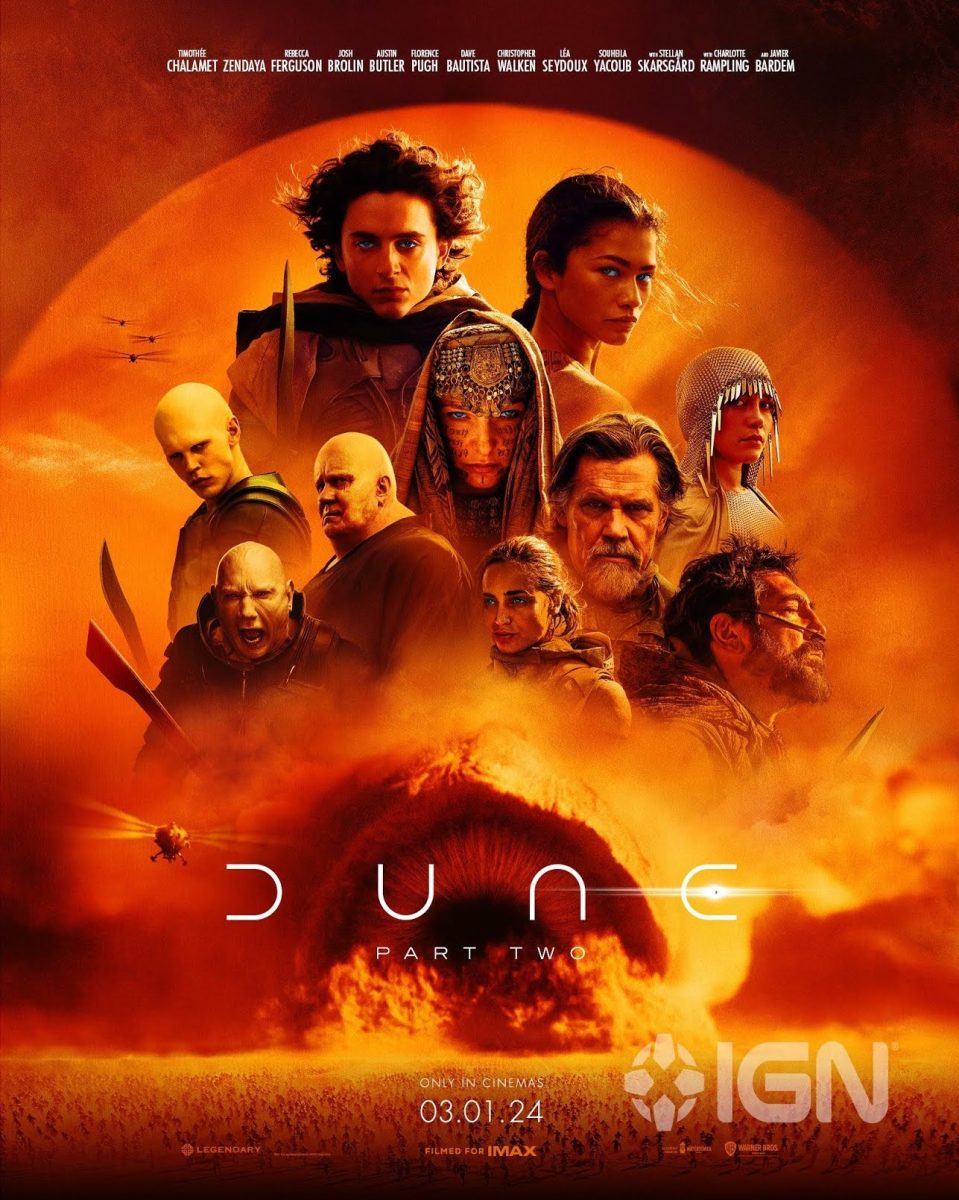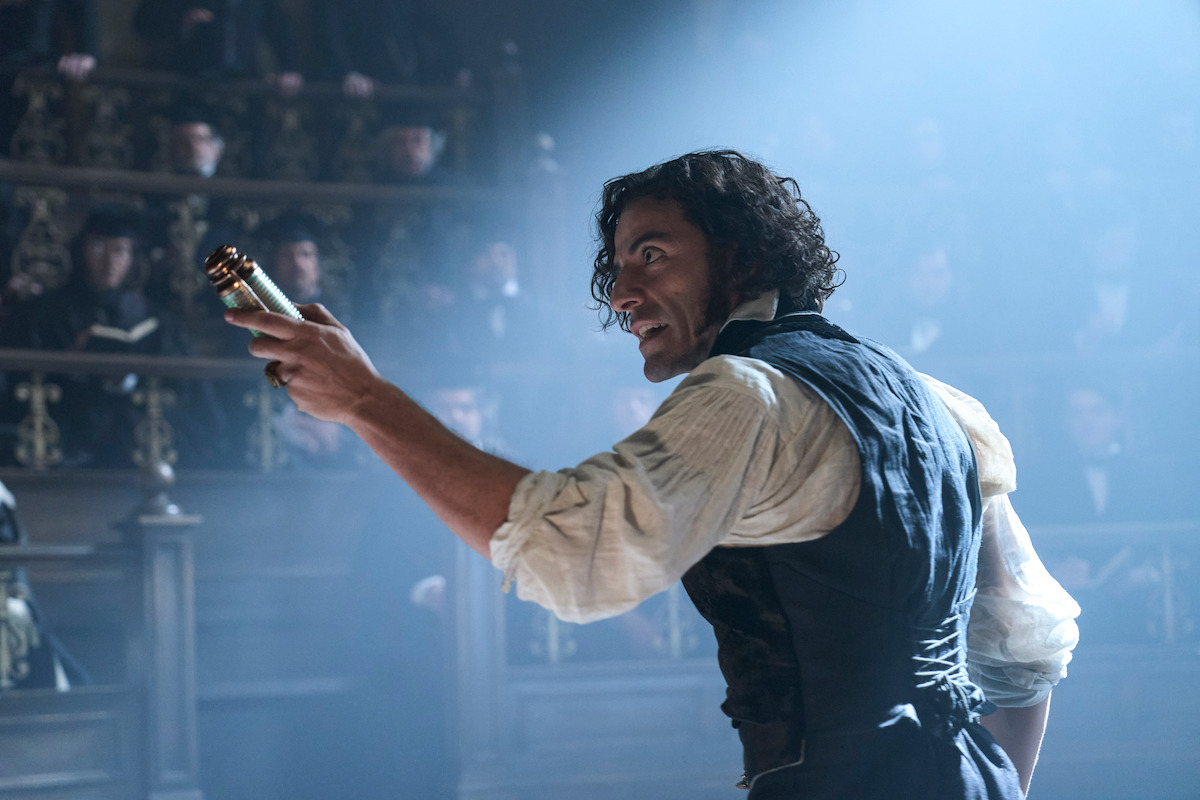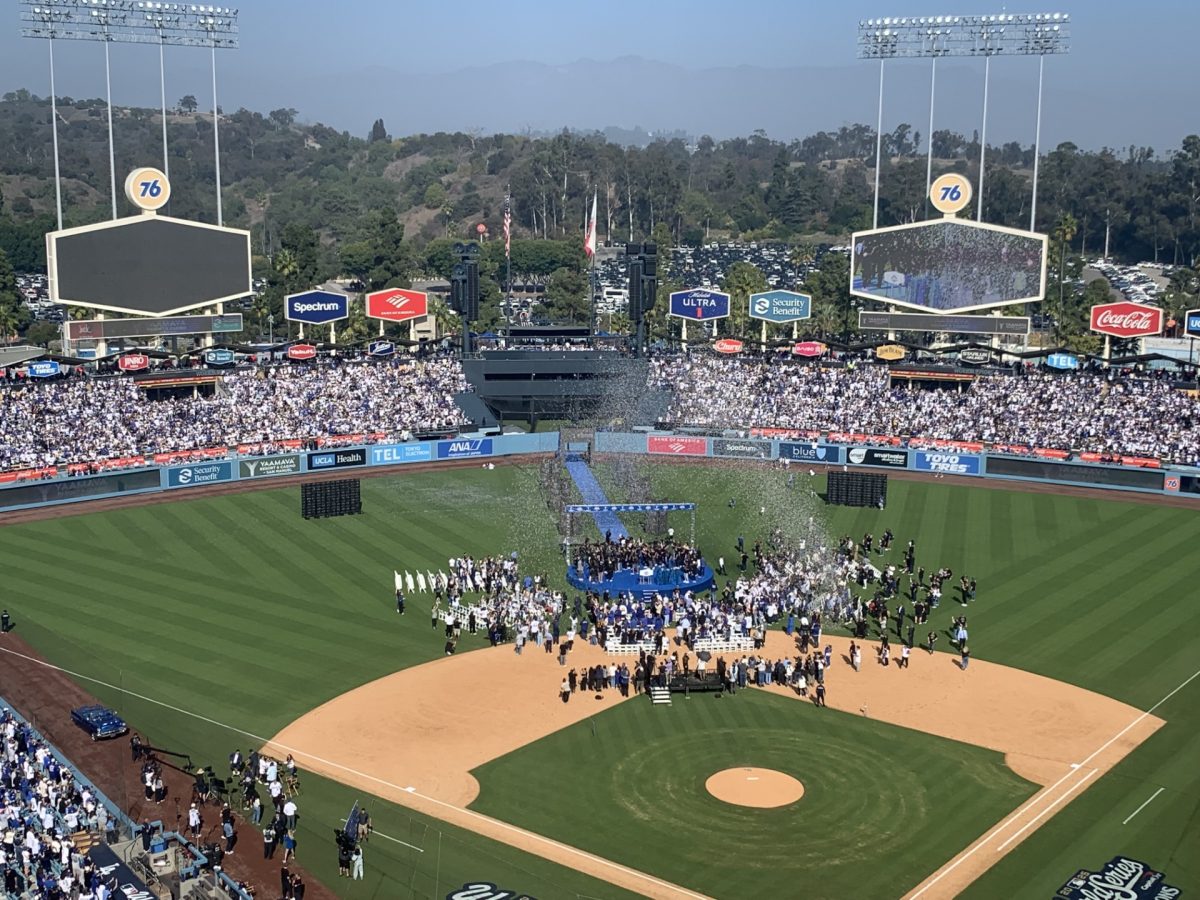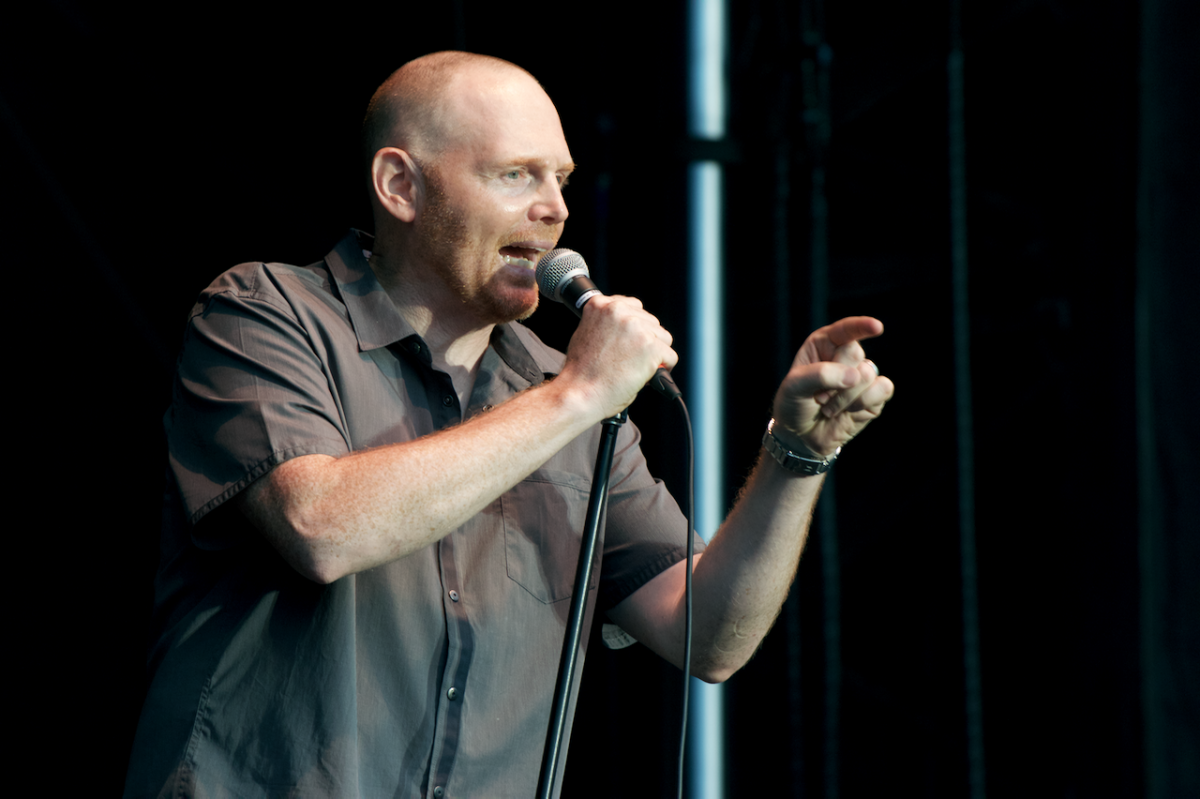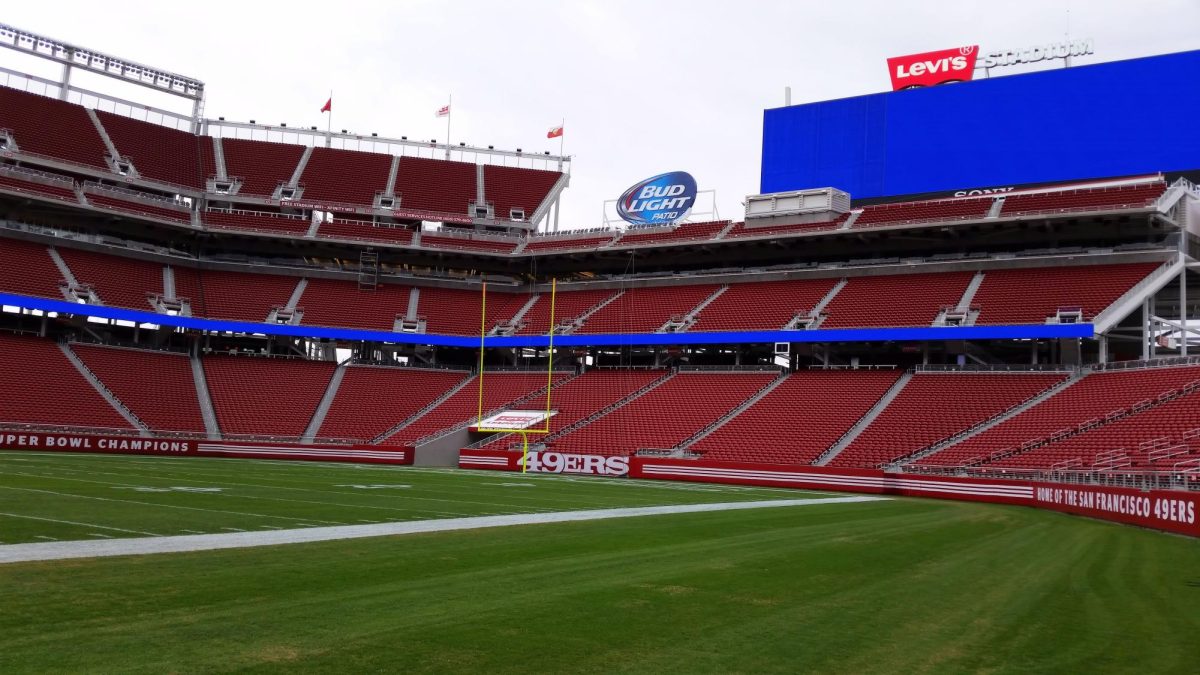It is a rare experience to watch a 166-minute film and wish it was longer. In his follow up to 2021’s “Dune,” director Denis Villeneuve succeeds in achieving his vision to create one of the most ambitious science fiction epics. With an already stellar track record – “Arrival,” “Blade Runner 2049″ and “Prisoners” – Villeneuve’s second venture to the planet Arrakis puts “Dune: Part Two” at the top of his filmography.
The sequel is ambitious, brash, and spectacular. Visually dazzling and thematically nuanced, Villeneuve further improves on the already great first film to complete his adaptation of Frank Herbert’s 1965 novel of the same name, although the story is far from over. If you are looking for an action packed saga that is hilarious, full of intense thrills, and will give you goosebumps till it’s very last shot, look no further.
The Oscar-winning precursor “Dune” was a more docile, meditative film that focused on setting up the world of the film and its characters. Although some criticized its lack of action and slow pacing, you can understand the difficulties Villeneuve faced in adapting the dense source material.
For all that “Dune” set up, “Dune: Part Two” is the payoff. It is more massive, action packed and humorous than the first film.
If you missed the first one, don’t worry, there’s just an incredibly dense and complex backstory you need to know to understand what’s going on. Here are the basics: Paul Atreides – played by Timothée Chalamet – is the chosen one, he dreams of Zendaya, who plays a Fremen warrior named Chani, his mom’s a witch, and “spice” is the most valuable commodity in the universe – like oil if it was a psychedelic orange sand that you could get high on.
Warning: spoilers ahead.
We pick up where we left off on the planet of Arrakis – which was once called Dune – with Paul and his mother Lady Jessica, played by Rebecca Ferguson. They journey across the desert with the Fremen, natives of Arrakis, after escaping an attack from their rival House Harkonnen. Led by Baron Vladimir Harkonnen, played by Stellan Skarsgård, the Harkonnens have taken control of Arrakis. I know it’s called science fiction but a tyrannical leader named Vladimir invading another territory? Talk about relevant.
Throughout the film, Paul struggles with being Lisan al Gaib, a prophesied messianic figure amongst the Fremen that will liberate them and lead them to paradise. Basically, he’s their white savior.
Paul has visions, thanks to the “spice,” where he leads the Fremen into a Holy War that consumes the universe. This understandably stops him from embracing his destiny. But his actions through the film makes believers out of an increasing number of Fremen and with his mother – now with even more psychic powers and face tattoos – pulling the strings, he may not have a choice.
Although the mesmerizing action scenes of Fremen fighting Harkonnen soldiers and destroying spice harvesting machines, and Paul having knife fights and riding mile-long giant sandworms, are jaw-droppingly great, the intricate themes are the most intriguing aspect of the film.
In “Dune: Part Two,” Villeneuve explores the power of faith and religious figures, although mirroring the same themes as they appear in the book. Paul’s indecision to become the messiah that thousands of people consider him to be, and realizing he has to accept his fate is the driving force of the film’s plot. Despite the warning of his visions, he believes he has control over his destiny and will indeed lead the Fremen to paradise. Though it seems in the end, Paul’s intentions may not matter as this is the cautionary message of “Dune.” Messianic figures, no matter how good their intentions, are dangerous and create corruptible power structures.
Chalamet’s performance across the two films, from being the naive young heir to the House Atreides to becoming a Fremen warrior and then ultimately Lisan al Gaib, must be lauded. Although it does fall flat at certain points, as in a scene where he storms into a Fremen cave shouting that he is their savior in aims of asserting control. Still, he has been infallible in embodying the changes in the character of Paul Atreides through his arc.
Opposite him, Zendaya puts in a solid performance as Chani as well, with their romance being one of the central subplots of the film. There was some chemistry between the two leads, although it can be said Villeneuve failed to extract all of it. It’s not exactly a romance film, but he would’ve landed a bigger punch with Paul’s betrayal at the end, especially considering the film ends on a lingering shot of an emotional Chani.
In “Dune: Part Two”, it is the supporting characters that shine the most. Stilgar, a Fremen tribe leader played by Javier Bardem, provided the film’s most hilarious moments, giving the whole film more character as opposed to the somewhat more monotonous first film.
Rebecca Ferguson was phenomenal as Lady Jessica with a more frightening performance as her character becomes increasingly ambiguous in her intentions. Christopher Walken and Florence Pugh as Emperor Shaddam IV and his daughter Princess Irulan were great additions to the series.
Although, nobody stole the spotlight as much as Austin Butler, who’s shaken off his Elvis accent to play Feyd-Rautha Harkonnen, the psychopathic nephew of Baron Vladimir Harkonnen.
From the second he appears on screen until the end of the film where he’s defeated by Paul in a battle for the emperor’s throne, Butler is electric. He’s a disturbing villain who is difficult to figure out and seems to have made bloodshed a hobby, as exhibited in a scene where he tests out a newly fashioned knife by killing the servant who gave it to him. It is difficult to think about the film without being haunted by Butler’s cunning smile.
Cinematographer Greg Fraser, who was awarded the Oscar for Best Cinematography for the first film, one-ups himself in the sequel.
“Dune: Part Two” is beautiful. From the sandy landscapes of Arrakis to the devoid-of-color atmosphere of Giedi Prime, the Harkonnen home planet, Fraser and Villeneuve engineer images that are deeply immersing. Various shots of sand and the glittering orange spice flowing through Arrakis’ terrain, Paul’s contemplative face, showered in the harsh yellow sunlight, and the fireworks on Giedi Prime that look like splattered black ink.
Fraser brilliantly creates an almost tangible feeling of whatever world we are in. Although, it is the musical score by Hans Zimmer that ties everything together.
The composer, known mostly for his collaboration with Christopher Nolan (“The Dark Knight,” “Inception,” “Interstellar”), won his second Oscar for the first film. Although many tracks migrated over from the first film, his score for “Dune: Part Two” is even more excellent.
The soundscapes Zimmer crafts allows Villeneuve to deliver the emotion he attempts to convey in each scene. It’s impossible to not get goosebumps in the film’s most intense scenes when Zimmer’s score starts to swell.
Frank Herbert’s novel through the years was called “unadaptable.” The book, which is nearly nine hundred pages – of which 80 are an appendix explaining the world’s terminology and backstory – was thought to be fixated in the literary medium.
After multiple failed attempts over the past fifty years by accomplished filmmakers like David Lean (“Lawrence of Arabia”), Ridley Scott (“Alien”), and Alejandro Jodorowsky (“The Holy Mountain”), the book was considered too dense to be made into a film. Although in 1984, David Lynch (“Mulholland Drive”) was able to successfully release a film adaptation, it was received poorly by critics and audiences alike, and Lynch himself has repeatedly stated his disappointment with the final product.
These challenges make what Villeneuve, who also co-wrote both films, achieved even more special.
However, his work is not done yet. Villeneuve plans to adapt the sequel to the novel, “Dune Messiah,” as the third film of the series.
You can only imagine how much grander he can go with the next film. Those who watched “Dune: Part Two,” will be waiting eagerly in anticipation, as they seek resolution to Paul’s story.
With the sequel, Villeneuve answered a lot of the questions asked in the first film, however, he ends it with a pivotal one yet to be answered. Will Paul Atreides lead his people to paradise? Or will it all end in a holy war that engulfs the universe like an unquenchable fire?

